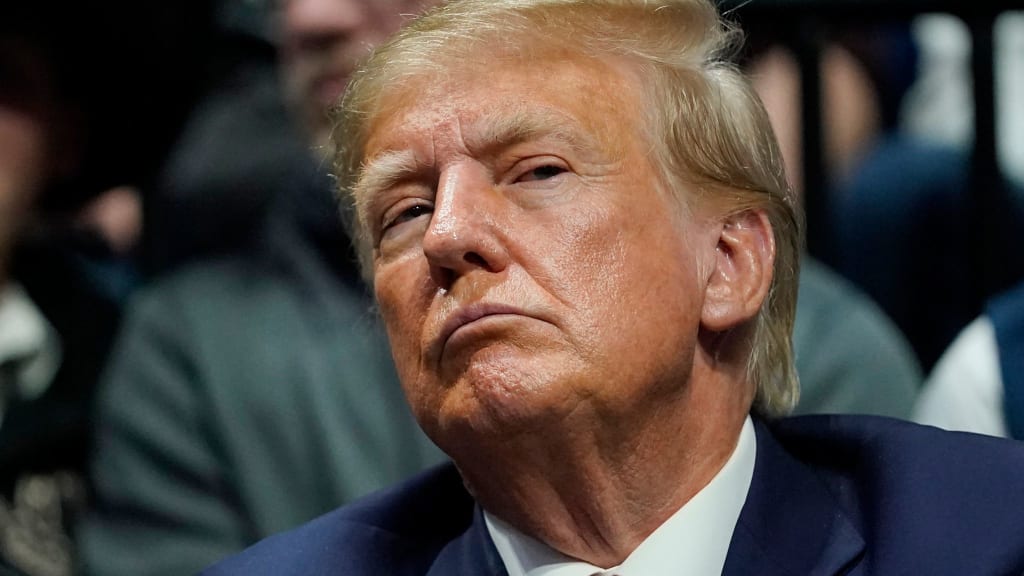
TRUMPS TRUTH
The phrase "truth isn't truth" made headlines in 2018 when it was uttered by President Donald Trump's personal lawyer, Rudy Giuliani, during an interview on NBC's "Meet the Press." The comment was widely criticized as emblematic of the Trump administration's propensity for obfuscation and deceit.
But the notion that truth is subjective or malleable wasn't new with the Trump era. Philosophers and scholars have debated the nature of truth for centuries. However, Trump's disregard for facts and embrace of alternative realities has amplified the debate and raised important questions about the role of truth in public discourse and political life.
At the heart of the matter is the question of whether objective truth exists, and if so, how it can be known. Trump's supporters argue that he speaks the truth, while his critics say he lies constantly. But what does it mean to say that someone is telling the truth, or that they are lying?
One view is that truth is simply a matter of correspondence between a statement and reality. If a statement accurately describes the way things are in the world, then it is true. If it does not, then it is false. On this view, truth is objective and independent of human beliefs or perceptions.
Another view is that truth is a social construct that emerges from shared beliefs and practices. According to this view, truth is not something that exists independently of human beings, but is rather a product of human activity and culture. In this sense, truth is always relative to a particular community or context.
Trump's approach to truth seems to be more in line with the second view. He often makes statements that are demonstrably false, but that resonates with his base of supporters. For example, he has repeatedly claimed that he won the 2020 presidential election, despite overwhelming evidence to the contrary. His supporters believe him because they trust him, not because they have independently verified the truth of his claims.
This approach to truth is dangerous because it undermines the very basis of public discourse and political decision-making. If there is no objective truth that can be agreed upon, then there is no way to resolve disputes or make informed choices. Instead, everything becomes a matter of opinion, and the loudest or most powerful voices prevail.
Moreover, Trump's approach to truth has eroded trust in institutions and experts that are crucial for a functioning democracy. By constantly attacking the media, the judiciary, and other institutions that are designed to hold leaders accountable, he has created an atmosphere of suspicion and cynicism. This makes it harder for people to distinguish between fact and fiction, and easier for demagogues to manipulate public opinion.
In conclusion, the idea that truth is subjective or malleable is not new, but the Trump era has brought it to the forefront of public debate. Trump's disregard for facts and embrace of alternative realities is dangerous because it undermines the very basis of public discourse and political decision-making. As a society, we need to reaffirm the importance of objective truth and the institutions that are designed to uphold it.
How to Find the Truth Behind Trumps Tweets
Donald Trump has been one of the most controversial and polarizing figures in modern politics, with his tweets often causing quite a stir. In a time when there's so much misinformation online, it's more important than ever for readers to fact-check the content that they consume, especially when it comes to politics. This post will discuss why fact-checking is important, the tools available for fact-checking Trump's tweets and how to avoid falling into the trap of misinformation on social media.
The Power of Trump's Tweets: Understanding the Impact
Trump's tweets have the potential to create a significant impact on both domestic and foreign affairs. As one of the most high-profile politicians in the world, his opinions matter, and they have been known to influence people's perception of different issues. By tweeting about certain topics, Trump can shape the conversation, amplify a message, or distract the public from other events that may be of greater importance.
The Importance of Fact-Checking in Politics
In politics, it is vital to engage in fact-checking, especially when it comes to issues that can have far-reaching consequences. False information can cause panic, anxiety, and hinder political progress. This is why many organizations are committed to fact-checking, especially in the current climate of fake news and the spread of misinformation.
The Top Tools for Fact-Checking Trump's Tweets
There are several tools to help readers fact-check Donald Trump's tweets. These include:
Exploring Fact-Checking Websites and Tools
Many websites are dedicated to fact-checking news, especially in the political space. These sites include FactCheck.org, PolitiFact, and the Washington Post's Fact Checker. They collect data, investigate, and present reliable and accurate findings about different issues, claims, and assertions. When considering political claims, it's recommendable to use different fact-checking websites for verification.
The Benefits of Using Independent Fact-Checkers
An independent fact-checker is a non-partisan party that has no political affiliation or leanings. The advantage of using independent fact-checking sources is that they have no interest in the political outcome and can, therefore, scrutinize the facts without any external influences. For instance, the Pulitzer Prize-winning site called PolitiFact is an independent fact-checker, and it has been a reliable source for verifying political statements.
The Role of Social Media in Spreading Misinformation
Social media has become a leading source of information for most people in today's digital age. It includes platforms such as Facebook, Twitter, and Instagram. However, these platforms have also become fertile ground for misinformation to spread.
The Dangers of Confirmation Bias and Echo Chambers
When it comes to politics, confirmation bias and echo chambers can be problematic. This is because people tend to follow those with similar views on social media, creating a cocoon where they don't have to engage with opposite ideas or facts. It becomes dangerous because opposing ideas can challenge beliefs and may shake people's worldview.
Strategies for Avoiding Misinformation on Social Media
To avoid misinformation on social media, it's crucial to adopt a healthy level of skepticism. Don't take every post you see as gospel truth. Instead, check the actual source of the claim or the image, especially if it's a sensitive issue. If it's a political tweet, consult fact-checking websites to see if the claim is backed by reliable data. Moreover, remember that confirmation bias is not helpful, so be willing to engage with opposing views and introspect about your beliefs.
Conclusion
In this age of information, it's more important than ever to gather accurate and reliable information, especially when it concerns politics. Donald Trump's tweets can have far-reaching consequences, and it's essential to verify any claims that he makes. By engaging in fact-checking, readers can better understand the issues at hand and make informed decisions. Moreover, social media can be a great source of information, but it's important to remember that not everything is true. As we navigate this social media age, it is essential to embrace skepticism and avoid confirmation bias so that we can get a holistic view of issues.
About the Creator
sadik
iam a creater






Comments
There are no comments for this story
Be the first to respond and start the conversation.